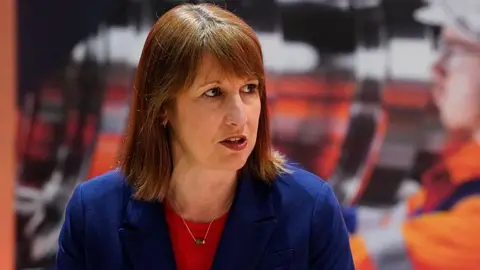In a recent statement, UK Chancellor Rachel Reeves expressed her understanding of the trade concerns raised by former President Donald Trump, particularly focusing on trade tariffs. As Reeves prepares for discussions with US Treasury Secretary Scott Bessant in Washington on Friday, she conveyed her awareness of the issues that have led to the imposition of tariffs, which are pivotal topics in transatlantic trade negotiations.
Reeves pointed out the shared political landscapes between the UK and the US, noting that both governments were elected amidst significant voter frustration regarding economic conditions. This similarity draws a parallel between the political climate in both nations and the economic measures that have emerged since their leaders took office. According to her statements, the UK is committed to actively pursuing a trade agreement with the US, which has been a focus of the government’s agenda.
In her discussions, Reeves highlighted the possibility of lowering tariffs on US car imports. Currently, the UK maintains a 10% tariff on these imports, but she hinted that this could be reduced to 2.5% as part of a broader trade agreement. This potential tariff adjustment symbolizes the UK’s willingness to negotiate terms that can foster a more favorable trade relationship with its ally.
As Reeves addressed the pressing issue of tariffs, she mentioned the growing concern over global trade imbalances. “We’re all grappling with this issue of tariffs, but I think that there is an understanding why President Trump wants to address some of the global imbalances there are in the system,” Reeves said. This statement reflects a diplomatic approach to recognizing Trump’s position on the matter, despite the challenges tariffs pose to international trade.
Moreover, the negotiations between the UK and the US come against the backdrop of previously imposed tariffs, including a significant 25% on car imports to the US from various countries, including the UK. The broader global landscape, with multiple countries affected by various tariff rates, creates an intricate web of trade relationships that both Reeves and US officials are keen to navigate. For instance, US Vice-President JD Vance recently expressed optimism about the potential for a trade deal with the UK, adding a sense of urgency and hope to the discussions.
In addition to her focus on US relations, Reeves has been engaging with European and Canadian officials to remove barriers to trade, emphasizing the need for collaborative efforts to ease constraints that impact markets. Nevertheless, she acknowledged that ongoing economic uncertainties affecting bond and equity markets render it difficult for substantial investments to be made in the UK economy.
The Chancellor was also conscious of the broader implications of any trade agreements, cautioning that the UK would not celebrate a deal without consideration of its impact on other nations. With an eye on the future, Reeves indicated a preference for strengthening ties with Europe, suggesting that the UK’s relationship with the European Union (EU) could be of even greater importance. She mentioned an upcoming summit with the EU in May, which aims to “reset” trade relationships.
Reeves’s remarks underscored her belief in the importance of rekindling connections with European neighbors, viewing them as essential trading partners. “Obviously, I’ve been meeting with Scott Bessent while in Washington, but I’ve also been engaging with finance ministers from France, Germany, Spain, Poland, Sweden, and Finland,” she revealed. This outreach reflects a strategic approach, aimed at reinforcing trade relationships that are vital for British jobs and consumers.
In summary, Chancellor Rachel Reeves’s statements ahead of her meeting with US Treasury Secretary Bessant highlight her understanding of the complexities of international trade and the importance of fostering cooperative relationships, both with the US and with European nations. As negotiations unfold, the focus will remain on navigating tariff issues while simultaneously strengthening essential partnerships that benefit the UK economy in the long run.



